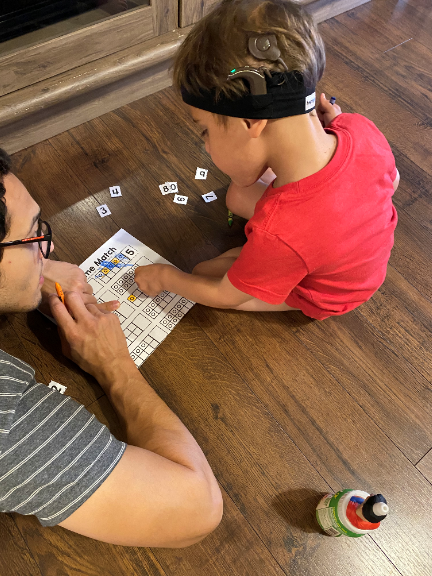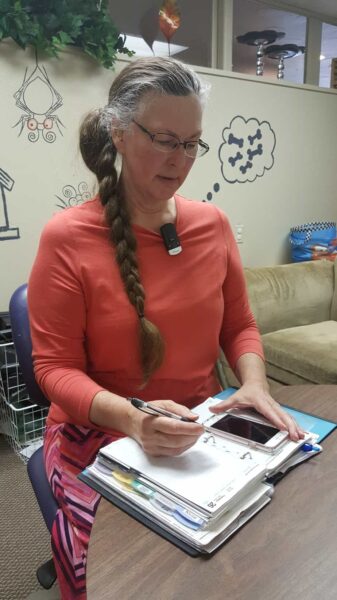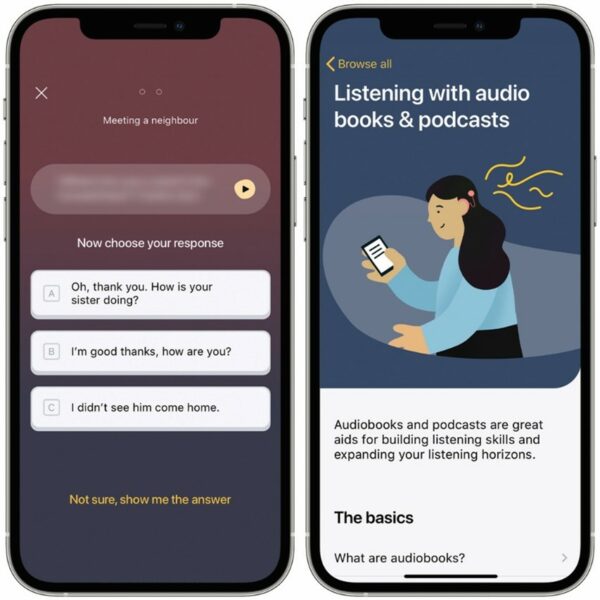For cochlear implant recipients, practicing your listening skills can help improve your hearing and communication with your loved ones. Some recipients have a spouse, adult child, friend, or another family member who’s consistently available to help with hearing practice and activities. Other recipients are looking for opportunities to practice their listening on their own. Whether you have a regular hearing practice partner or not, Cochlear provides tools and resources to help you work on your listening skills in the ways that work best for you.
Hearing activities you can complete with a practice partner
Improving your hearing outcomes is a team sport! While it’s true that you can work on hearing rehabilitation on your own, a practice partner can also play a valuable role in your hearing journey. So enlist a family member, friend, neighbor or colleague and check out these active listening exercises to help you hear your best with a cochlear implant.
- Try the activities in the Hearing Rehabilitation Manual. This booklet of hearing practice exercises was in your Cochlear backpack when you received your sound processor, and you can also use digital versions in English, Spanish, and French. The activities can help you recognize environmental sounds, use context to understand words and sentences, and practice your conversation skills.
- Play a game, read a book, go for a walk. Feel free to get creative with the way you and your practice partner interact during listening sessions. A game like Simon Says™ or Twenty Questions™ can be a fun way to sharpen your listening skills and keep you engaged and enjoying yourself. Find two copies of the same book and practice following along while your practice partner reads aloud, or play “popcorn” and try to pick up where they left off in the story. You can also go for a “listening walk” and try to identify the sounds you hear around you, either in your home or outdoors.
- Use the Auditory Training Exercises to flex your hearing muscles. These exercises start with the building blocks of listening to help you develop your skills one at a time. Keep in mind that sitting side-by-side with your practice partner can help you practice without relying on lip-reading to aid your listening.
- As you make progress, keep challenging yourself. Once you’re able to complete simple listening exercises without too much trouble, you can add difficulty and keep improving your listening skills. Try out the exercises with different practice partners, and considering asking someone who’s voice is more difficult for you to understand if they will practice with you. You can also practice your listening with some background noise, like a fan or the TV on at a low volume. The Cochlear Wireless Mini Mic 2+ is a great tool for practicing your listening in noise because it can stream sound directly from your practice partner to your sound processor.
Are you the practice partner? If a spouse, family member, friend or neighbor has asked you to help them practice their listening skills, our caregiver resources can help you make the maximum impact on your loved ones’ hearing journey.
Hearing activities you can complete on your own
What if you don’t have a hearing practice partner to help you? Many of our hearing rehabilitation resources can be completed solo! If your family lives far away or you don’t have a regular practice partner, you can still engage with interactive listening exercises to help you hear your best with a cochlear implant. Check out our resources for practicing on your own, using digital tools and resources to sharpen your listening skills.
- The Cochlear Copilot™ mobile app1 for Apple® devices. This fun, interactive mobile app has hearing games and activities to help you hear your best. You can get real-world listening tips and tricks, play listening games with words and conversations, and even record some sounds in your daily life to practice with.
- Try out phone calls with Telephone with Confidence, available in both English and Spanish. Each day, call 1-800-458-4999 to listen to a new set of pre-recorded listening exercises including a word list, short passage, and long passage. You can follow along with the written scripts to check your listening.
- Meet virtually with a Cochlear Recipient Solutions Manager (RSM). Okay, so this one isn’t technically “on your own,” but you don’t need a practice partner to join you. These educational sessions can help you get started with your hearing implant, learn about rehabilitation resources, explore your accessories, and more. Register to meet with your RSM
- Audiobooks, podcasts, captioning, and more! There are so many formats for audio content available today for free or a very low cost. Immerse yourself in the world of spoken language by listening to audiobooks, podcasts, or watching television and videos with closed captioning. Choose materials that match your interests stay motivated and engaged. You may even be able to stream content directly to your sound processor to cut out any background noise and get crisp, clear sound to practice with.
Hearing rehabilitation can play a crucial role in your hearing journey and help you hear your best. You can practice your listening skills with a loved one, or with interactive digital resources, or with a combination of the two. No matter which method you choose to practice, the most important thing is that you dedicate the time and effort to improving your listening skills.
Want more suggestions for practicing your listening? Visit the Rehabilitation Resources webpage for tools and resources to sharpen your hearing skills, for everyone from babies and toddlers to teens and adults.
2
- For complete smartphone compatibility information, please visit www.cochlear.com/compatibility
- Apple, the Apple logo, Apple Watch, FaceTime, Made for iPad logo, Made for iPhone logo, Made for iPod logo, iPhone, iPad Pro, iPad Air, iPad mini, iPad and iPod touch are trademarks of Apple Inc., registered in the U.S. and other countries. App Store is a service mark of Apple Inc., registered in the U.S. and other countries.


